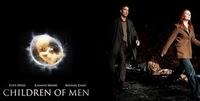Children of Men

P.D. James’ The Children of Men is a story about the English countryside, devoid of the English. It is the near future, and men have become infertile. Half-deranged, aging women coo over porcelain dolls, pushing their prams through empty streets. An increasingly lonely and oppressed population struggles to maintain normalcy in Britain while chaos rules the rest of this world without hope. And from this infertile world comes new life, in the form of a Christian woman and her child. Our hero, historian and academic Theo, finds redemption in helping the mother in her quest to have her birth on her own terms, rather than turning her and her unborn child over to the authorities. In the end though, we’re left with a questionable victory: Power moves from the hands of one man to another through violence, and through the Coronation Ring, the wedding ring of England.
Alfonso Cuaron’s film adaptation, Children of Men, is radically different, set in a grittier, more action-packed dystopian London. As might be expected with a book-to-film adaptation, gripping curbside discussions have been replaced with even more gripping coffee shop bombings, and distant tales of trouble on the Isle of Man penal colony have been swapped out in favor of a kidnapping and chase in what’s become an active war zone. Interestingly, these action-oriented changes actually serve to make the film more realistic than the book – this future world looks uncannily like the present, complete with visual echoes of Iraq and Guantanamo.
The book’s vaguely Christian Madonna is abandoned in favor of strong female activists, and its messages run broader as well: Every child is precious. Violence never works, only pushing away the peace you strive for. Personal loss can be overcome by love for the collective. The future is worth dying for.
What both the film and the book have at their hearts though, is a reverence for motherhood. Children of Men shows us a future where the one constant is the power of mothers, midwives, and childbirth. In a world where women are taught that childbirth is something they need drugs, scalpels and doctors to get through, these portrayals of the strength of women and the beauty and transformative power of birth are a welcome source of hope. Maybe the future can be a fertile one after all.